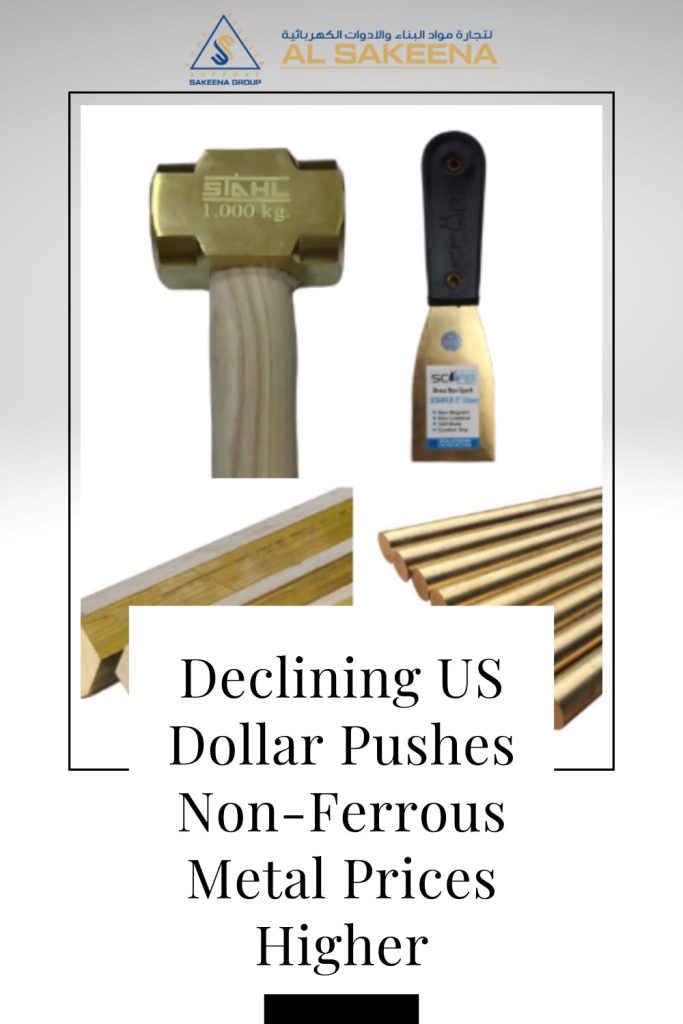Your One-Stop Shop for Engineering, Electromechanical & Construction Tools
Your One-Stop Shop for Engineering, Electromechanical & Construction Tools

The world commodities market is not an exception of the notable fluctuation rates, and the constant drop in the indices of the US Dollar (DXY) has to be proclaimed as one of the most influential trends during recent years. Copper, saccharina magnus and silver are not-ferrous metals whose prices have improved as the dollar loses ground.
This has resulted in price surge affecting manufacturers, traders and industries globally; the building industry, electronics and the automobile industry. It is imperative to understand this trend as it is vital to businesses that use metals in production or trade thereof.
In this article we shall examine how the deteriorating dollar increases the price of non-ferrous metals, the market impacts as well as why business firms should be careful to maneuver in this emerging environment.
The US Dollar Index measures the value of the US dollar relative to a basket of major currencies. A weakening dollar makes commodities priced in dollars cheaper for foreign buyers, creating increased demand and pushing prices higher. Non-ferrous tools, which are globally traded commodities, are particularly sensitive to these shifts.
Key factors behind the dollar’s weakness include:
When the dollar depreciates, global traders and manufacturers turn to metals as a store of value or hedge against currency fluctuations, leading to a surge in non-ferrous metal prices.
Copper and brass are some of the most important products to benefit this market change given that they are valuable in electrical wiring, plumbing, and precision works. Traders and manufacturers are now piling up on such products like Brass Hex Bar and Brass Round Bar that find immense use in construction industry and marine and industrial work.
Such bars have been necessary in the industries that necessitate durable and corrosion-resistant products with the recent heightened pace of infrastructure development worldwide. Due to the increased prices of raw materials, Reliable Suppliers are being resorted to by the companies to guarantee overall availability.
Metal-intensive industries are reevaluating their supplier and manufacturing policies. Most are trying to sign long-term contracts in order to stabilize prices, but other are switching to lighter or more cost-efficient alloys.
Products like Copper Shim Stock and Lyon Brass Shim Stock have become highly sought-after due to their precision engineering qualities and their role in machinery, aerospace, and electronics manufacturing.
Adapting to price volatility also entails long-term tools investment that would enhance the operational efficiency. Many companies are relying on heavy-duty tools like Non-Spark Sledge Hammers and Non-Spark Slogging Spanners to maintain safety and reliability in hazardous working environments.
With the surge in demand, counterfeit and low-quality tools have flooded the market. High-quality equipment is critical for maintaining operational safety and productivity. For instance, a 4 Row Brass Wire Brush and Brass Scraper are essential for cleaning, polishing, and maintenance work in construction, automotive, and marine industries.
Similarly, tools like a Ratchet Spanner provide precision and torque, making them indispensable for professionals who rely on efficiency and accuracy. Investing in certified, premium tools ensures long-term savings and better performance.
Due to increased non-ferrous metal prices, the UAE as a commercial trading and manufacturing hub has been affected. With higher costs on brass and copper products used in the power industry, plumbing, and precision instruments, the construction industry in particular has been the hardest hit.
Nevertheless, its geostrategic location as a transportation hub on the global level means that businesses can find the superior quality of materials at reasonable prices. Companies in Dubai and Abu Dhabi are intensifying the bonds with their suppliers in order to maintain consistent supplies of essential products like non-sparking tools, copper shims, and brass bars.
The need to manufacture precision engineering equipment has also increased, and thus reliable suppliers have scope to capture the market.
The volatility in currency markets and commodity prices emphasizes the need for strong supplier partnerships and diversified sourcing strategies. Businesses must invest in high-quality products, maintain larger inventories of essential components, and closely monitor market trends to remain competitive.
In particular, tools and materials like Brass Hex Bar, Brass Round Bar, Copper Shim Stock, and non-sparking tools have become critical investments for industries operating in challenging environments. Partnering with certified suppliers ensures not only material quality but also compliance with international standards, boosting productivity and safety.
The depreciation of the US Dollar Index has spread a wave in the world commodity markets, something that has greatly affected the prices of non-ferrous metals. The businesses that depend on brass, copper and other metals see an increase in costs, yet find opportunities to purchase quality materials and tools to be used in the long-term.
Whether it is precision components like Lyon Brass Shim Stock, industrial tools like Non-Spark Slogging Spanners, or essential accessories like the 4 Row Brass Wire Brush, investing in quality remains key.
Industries in the UAE that are seeking to navigate this dynamic market environment can count on Al Sakeena Building Materials & Electricals Trading as a reliable partner having quality non-ferrous tools and materials needed to stir up the increasing requirements of different industries globally.